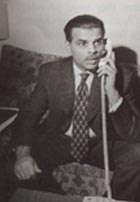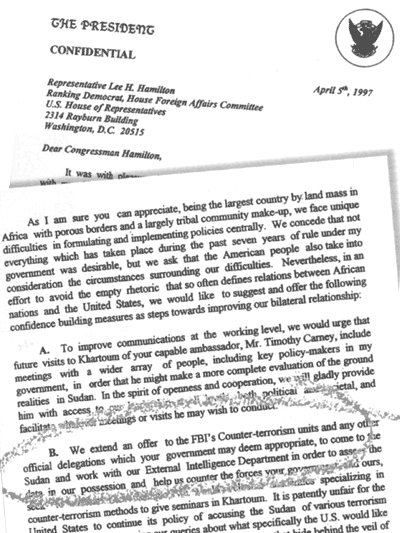| |
| © VANITY FAIR |
 |
|
|
 |
|
A focus on the wrong enemy was not the only mistaken feature
of U.S. intelligence on Sudan. In 1993 the U.S. Embassy sent
home all nonessential staff, spouses, and children, because
the CIA claimed it had evidence that Americans were at risk
of terrorist attack.
One report even claimed that there was a plot to bomb a party
for the children of Khartoum's American embassy workers. None
of these threats were real. Petterson says, "There's
no question there were mistaken reports." President Clinton's
national-security adviser, Tony Lake, was uprooted with his
family and kept under Secret Service guard at Blair House,
the presidential guest quarters across Pennsylvania Avenue
from the White House. The reason was another bogus C.I.A.
claim that Sudanese agents were planning to murder him in
Washington. Finally, at the beginning of 1996, just after
Petterson had come to the end of his tour, the embassy was
emptied of Americans altogether, again because of unspecified
"security threats".
His successor, Tim Carney, would somehow have to do his job
based a thousand miles away, in Nairobi, Kenya. This was unjustified,
Petterson says.
The veteran C.I.A. Africa specialist says that this inaccurate
intelligence was the product of disinformation, fed by an
organised ring whose motives were a mixture of malice and
greed. All these reports cost the C.I.A. money. One of its
members, a Tunisian, Ali bin Mustafa Homed, was convicted
of espionage in Sudan last summer and given a 14-year jail
sentence. Yahia Baviker, the Mukhabarat deputy chief, confirmed
that feeding disinformation to foreign intelligence agencies
formed one of the charges against Homed.
Sudan was aghast at these developments. However, the radical
wing of the government, led by the philosopher Dr. al-Turabi,
was losing ground to the pragmatist moderates, who wanted
good relations with the West. (In
1998, al-Turabi was placed under arrest, where he remains.)
So when, in February 1996, Carney began to convey America's
demand that Sudan expel bin Laden, mainly because of his campaign
against the Saudis, his
audience was surprisingly receptive. Gutbi al-Mahdi, the former
Mukhabat boss, who was then serving as the Sudanese president's
senior adviser, says Sudan did not object on principle. The
arguments he and his
colleagues used were more practical. "We said, 'Here
he is under control, and we know everything about him. Here
in Sudan he is under our supervision.'". Once bin Laden
was expelled, al-Mahdi adds, "he had absolutely no choice
other than to become a full-time radical". About 300
Afghan Arabs went with him. According to an Egyptian intelligence
source, "Most of them are now terrorists".
Bin Laden was expelled in May 1996. Despite this evidence
of Sudan's willingness to cooperate, the U.S. appeared to
have no interest in seeing what it could learn from Sudan.
Mahdi Ibrahim Mohamed, now the information minister, went
to Washington as Sudan's ambassador in February 1996. A long-standing
Americophile, he had been educated in Michigan and California:
"I like the country, I like the people. I went as ambassador
for three years, with a positive view that America was open,
free, open for dialogue.
What I found was a major surprise and disappointment."
Mohammed spent three years trying to get a meeting with the
State Department's assistant secretary for Africa, Susan Rice,
only to find himself fobbed off on junior officials. He was
no more successful in his efforts to see the National Security
Council's Tony Lake, or his successor, Sandy Berger. The N.S.C.
staff continued to accuse Sudan of harboring terrorists. Mohamed
begged the officials to make a specific allegation, but they
refused. "I said, 'Give me any information about any
terrorists, any camps, as you believe it to be, and we will
take it very seriously.' The response was 'Your government
knows. You must know. We don't like to expose our sources."'
Ambassador Mohamed conveyed an open offer: the C.I.A. and
F.B.I. could send a joint investigative team, which could
travel freely throughout the country. "I used to say,
'Go anywhere, take a plane from Khartoum and say where you
want to go once we're in the air."' It was not taken
up. In February 1997, the offer was repeated in a letter from
Presidental-Bashir to Clinton. Al-Bashir suggested "a
mission tasked to investigate allegations that the government
of Sudan trains or shelters terrorists," with "freedom
of movement and contact and unrestricted choice of suspected
terrorist sites." Clinton never replied.
|
 |
 |
 |
|
THE
GO-BETWEEN
MansoorIjaz a friend of bill Clinton's couldn't
persuade U.S. officials to look at Sudans's
reports. (Right below) a letter from Sudanese
president Omar al-Bashir to Representative
Lee Hamilton offering information to the
F.B.I.
|
|
|
 |
It began to dawn on the Sudanese that one way of convincing
America that they were serious about fighting terrorists
was to offer U.S. investigators access to the Mukhabarat
files on bin Laden, al-Qaeda, and Egyptian Islamic Jihad.
Frustrated in their efforts to invite America in through
the front door, they resolved to try a back channel-the
multimillionaire Pakistani-American businessman and
fund manager Mansoor Ijaz. Then a big donor to the Democratic
Party, Ijaz was on personal terms with Clinton, Berger,
and A1 Gore. He was also fearful of the likely result
of U.S. refusal to engage with Islamic regimes, such
as Sudan: "As an American Muslim, I had a terrifying
vision of what could go wrong. I wanted to do whatever
I could to stop that happening."
As an investor, Ijaz was interested in Sudan's oil,
but he also shared "a fundamental sense of injustice"
at the way the country was being treated. From July
1996 until August 1997, he made six trips to Khartoum,
meeting Dr. al-Turabi, President al-Bashir, the Mukhabarat
chief, Gutbi al-Mahdi, and other officials. He suceeded
in convincing them that it was worth making a further
effort to persuade the U.S. of Sudan's sincerity-partly
by drawing America's attention to the intelligence on
al-Qaeda. His initiative produced its most dramatic
result in a letter dated April 5, 1997, from President
al-Bashir to Lee H. Hamilton, the ranking Democrat on
the House Foreign Affairs Committee.
|
|
 |
|
It stated, "We extend an offer to the F.B.I's
Counter-terrorism units and any other official delegations
which your government may deem appropriate, to come
to the Sudan and work with our External Intelligence
Department in order to assess the data in our possession
and help us counter the forces your government, and
ours. seek to contain." (My italics.) According
to Ijaz, Hamilton took the letter to both Madeleine
Albright and Sandy Beger, neither of whom replied. Ijaz
also wrote memorandums on his mission for Sandy Berger,
and in a series of conversations he spelled out exactly
what the Sudanese offer meant. He told Berger, "That
phrase [in the letter to Hamilton], 'to assess the data
in our possession,' was an explicit reference to the
data on bin Laden. The reference to 'the forces we seek
to contain' was an explicit reference to the attempt
to stop al-Qaeda spreading." Ijaz and his family
had shared their Christmas dinner in the White House
with the ain- tons. However good his access, he could
not budge U.S. policy on Sudan.
The Sudanese did not give up. Beginning in the autumn
of 1997, they made use of another private go-between,
Janet McElligott, a lobbyist who had worked at the White
House under George H. W Bush.
|
 |
 |
|
 |
| Like Ijaz before her, she assumed that rational statecraft
would, in the end, prevail. In this she was mistaken. On February
5, 1998, her efforts helped produce perhaps the smokiest of
all the smoking guns in this story: a letter direct from Gutbi
al-Mahdi of the Mukhabarat to David Williams, chief of the F.B.I.'s
Middle East and Africa desk. It read, "I would like to
express my sincere desire to start contacts and cooperation
between our service and the F.B.I. I would like to take this
opportunity with pleasure to invite you to visit our country.
Otherwise, we could meet somewhere else. Till then I remain,
yours truly."
Eighteen days later, on February 23, 1998, Osama bin Laden
issued his blood- curdling fatwa from his hideout in Afghanistan,
calling on all Muslims to kill Americans and Jews, adding
that civilians were now to be regarded as targets. McElligott
followed up the letter with a personal appeal: "I told
them, 'You do realize bin Laden lived there and they have
files on his main people?' There is simply no doubt the F.B.I.
knew what was available. The guy I dealt with said, 'I'd give
any- thing to go in there, but they'-meaning the State Department-'won't
let us."' David Williams did not reply to al-Mahdi's
letter for another four months. "Unfortunately,"
he wrote on June 24, "I am not currently in a position
to accept your kind invitation." He hoped "future
circumstances" might allow it, but for now the offer
had to be rejected. Six. weeks after that, bin Laden's al-Qaeda
network succeeded in exploding two pick- up trucks at the
U.S. Embassies in Nairobi and Dar es Salaam. They were reduced
to piles of bloody rubble in which 224 people lay dead or
dying.
|
 |
|
<< back
| next >>
|

|
 |
|
|
 |


